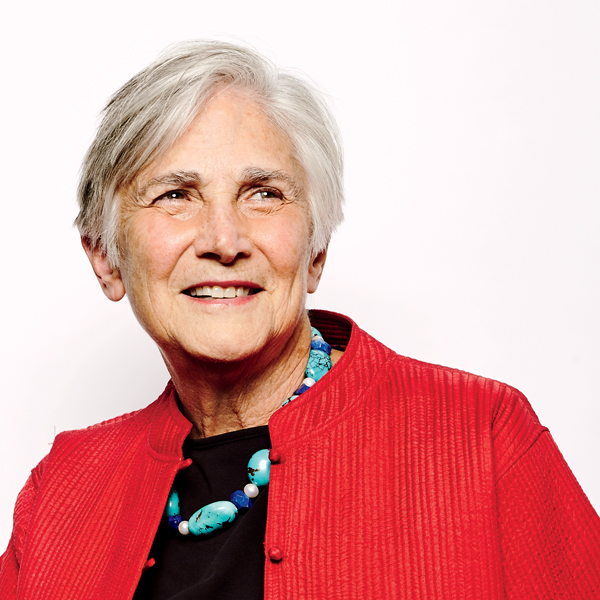The Education of Diane Ravitch

Evidence-Based
“I hope I’m remembered for listening to the evidence and being persuaded when I’m wrong. The late Robert Hutchins [President and Chancellor of the University of Chicago] used to say that you have to listen to the other fellow because he just might be right. And I’m astonished at how many people refuse to do that.”
At San Jacinto High School in Houston, Diane Ravitch’s homeroom teacher, Mrs. Ratliff, gave each graduating senior two lines of poetry. Ravitch received the closing words of Tennyson’s “Ulysses” – To strive, to seek, to find, and not to yield – and, from Byron’s “Childe Harold’s Pilgrimage,” Among them, but not of them.
It would be hard to imagine two more prophetic descriptions of Ravitch’s subsequent career, a 40-plus year ideological wandering through the unforgiving terrain of American schooling that has established her as education’s best-known living historian and, arguably, its most controversial figure. Ravitch has traveled from left to right and back again, morphing from editorial assistant at a socialist magazine to the protégé of Teachers College historian Lawrence Cremin, to Assistant U.S. Secretary of Education under the first President Bush, to fierce critic of standardized testing, accountability, school choice and privatization – policies that, she acknowledges, she helped script or for which she helped set the stage.
[ Read about the views of TC faculty, students and alumni on the future of public education. ]
Those shifts have cost Ravitch friends and former colleagues. But along the way she has fashioned a new kind of historicism, combining meticulously detailed reporting with unabashed statements of opinion. Her portrayal of history in which she herself has been an actor is a blend of confession, mea culpa, self-analysis and reportage reminiscent of Joan Didion, early Gloria Steinem and Jonathan Kozol.
“The soul of history writing is argument,” Ravitch writes in her preface to the latest edition of her most famous book, The Death and Life of the Great American School System (published in 2010 by Basic Books and revised in 2016).
Ravitch has openly expressed regret for “causing damage” through her past support for policies she now rejects. At 78, she travels the country and blogs compulsively, warning that privatization is causing the re-segregation of schools; that public schools and the teaching profession are in danger; and that test results have been “weaponized” to set up public education for a fall.
Still, “changing one’s mind is the sign of a sentient being,” she says. “One thing I hope I’m remembered for is listening to the evidence and being persuaded when I’m wrong. The late Robert Hutchins [President and Chancellor of the University of Chicago for much of the first half of the 20th century] used to say that you have to listen to the other fellow because he just might be right. And I’m astonished at how many people refuse to do that.”
Step by Step
Ravitch begins The Death and Life of the Great American School System (subtitled “How testing and choice are undermining American education”) with the passage of the Elementary and Secondary Education Act (ESEA) in 1965. Aimed at helping schools that served students in poverty, ESEA nevertheless gave Washington a potential lever – money – to “incentivize” states, cities and districts to do its bidding. Ravitch follows that seismic shift through to the end of the Obama administration, chronicling the transformation of American public education from a state-funded enterprise, in which decisions were made at the building or district level, to an arena increasingly ruled by market competition and business practices aimed at keeping the nation economically competitive.
For readers in 2017, one takeaway is that the policies of the Trump administration have not come out of the blue – that current U.S. education secretary Betsy DeVos is in many ways a logical successor not only to Rod Paige and Margaret Spellings, who held the job under George W. Bush, but to Obama’s secretary, Arne Duncan, as well. Another theme is an idea Ravitch absorbed from TC economist Harold Noah: that national systems, despite massive reforms, tend to revert to the status quo. But where Noah was speaking of the reemergence in the Soviet Union of special schools for the children of elites, for Ravitch, the return to form in the United States is re-segregation – the de facto re-establishment of “the dual system that was ruled unconstitutional by the U.S. Supreme Court in its 1954 Brown v. Board of Education decision.”
For Ravitch, a key milestone along that pathway was A Nation at Risk, the 1983 report that warned of “a rising tide of mediocrity” in American schools that threatened “our very future as a nation and a people.”
“Written in plain English, with just enough flair to capture the attention of the press,” A Nation at Risk, in Ravitch’s view, unwittingly “laid the ideological and rhetorical groundwork for the corporate-style reformers who three decades later maintained that our schools were declining and failing, that public education itself was ‘broken’ and obsolete, and that radical, free-market solutions were called for.”
Chief among those “reformers,” Ravitch says, were Obama and Duncan, whose Race to the Top program made $5 billion accessible to only those states that pledged, among other things, to develop more charter schools. And charters, Ravitch says, have “become an industry that’s ripping off the public.
“The initial bargain was ‘Give us autonomy and we’ll accept accountability.’ The deal now is, ‘Give us autonomy and we’ll accept no accountability. We’ll pick and choose our students. We’ll kick out the kids who get low test scores. We won’t accept kids with disabilities. We won’t accept the kids who are English language learners. And we’re not run by teachers – we’re run by corporations, and you can never fire the corporation if you have a problem.”

“To think critically and independently, as Teachers College preached, you often have to stand alone, and I’ve been willing to do that. I’m just trying to be right with my conscience – these are my values, this is who I am.”
To the Barricades
Ravitch has also repeatedly spoken out against education vouchers, which enable families to spend public education dollars to send their children to private schools.
“We know, after 25 years, that vouchers actually do harm,” she told an interviewer one afternoon early this past spring at her Brooklyn Heights apartment as she packed for a speaking engagement in Texas. “Most of the kids who get vouchers go to religious schools – in many cases, fundamentalist, evangelical schools, where they get uncertified teachers and learn science and history from the Bible. They’re not even learning 21st century mathematics. So most come in as low-performing and the next year they are worse.”
By her own account, Ravitch has spoken in almost every state in the country, to state unions and administrators, to the National School Boards Association, the National Education Association and the American Federation of Teachers. She is also the co-founder of The Network for Public Education, a grassroots organization that opposes, among other things, high-stakes testing, “the demonization of teachers” and for-profit management of schools.
“I don’t know if you see my blog, but I went to a performance of Les Miserables that was staged at Southold High School on Long Island,” she said. “And these kids were singing about being on the barricades.”
The blog, which has received 30 million hits in five years, has become one of her most powerful weapons for fighting the privatization of education.
“A lot of people who need to be heard count on me to get them an audience, because I have 140,000 followers on Twitter,” she says. “So some people in Chicago did a study of how charters are hurting the public schools and causing enormous fiscal distress. And it will have more eyeballs on my blog than it ever would in an academic journal, where you wait two years for it to be published, and then if you’re lucky, 1,000 people see it.”
Despite the election of Trump and his appointment of DeVos, Ravitch believes the public is finally waking up to what she calls, in her 2013 book, Reign of Error: The Hoax of the Privatization Movement and the Danger to America’s Public Schools, “a deliberate effort to replace public education with a privately managed free-market system.” She finds daily encouragement in grassroots efforts that range from a resolution passed last fall by the NAACP calling for a national moratorium on charters to the public outcry at the appointment of DeVos.
“All the switchboards were tied up in the Senate. Millions of emails came in. People who couldn’t take seriously that Arne Duncan, a Democrat, was a threat to public education – now that it’s Trump and Betsy DeVos, who has no association whatsoever with public education; who’s a religious zealot; now they get it.”
Increasingly, “it,” for Ravitch, is about more than education, or at least issues that bear on it. She’s almost as likely to blog about political opposition to health insurance for pregnancy and maternity as she is about schools.
In some ways, Ravitch has mellowed. While she remains critical of her adored TC mentor, the late Lawrence Cremin, for refusing to be politically engaged on issues of the day, she has come to understand how he might have viewed the risks.
“Maybe he was a lot wiser than me in that he understood that we never know everything, and maybe if we knew everything we would come at it differently,” she says, a bit ruefully.
Still, there’s not much she would have done differently.
“To think critically and independently, as TC preached, you often have to stand alone, and I’ve been willing to do that. I’m just trying to be right with my conscience – these are my values, this is who I am – and if there are people who don’t believe me, well, so be it. I can’t change that.”
— Joe Levine
Published Thursday, Jun 15, 2017